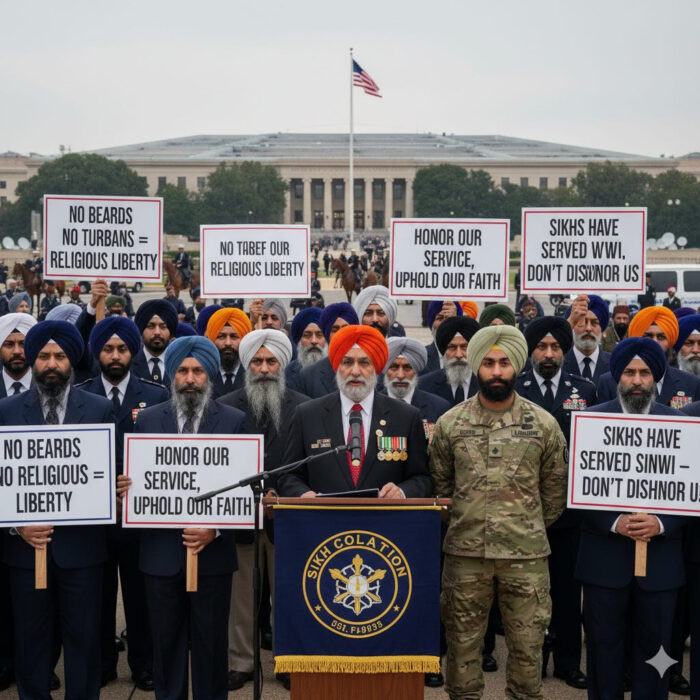
The Pentagon’s sudden clampdown on religious waivers for beards and turbans has ignited outrage worldwide, particularly among Sikh communities in the United States and beyond. In late September 2025, the Department of Defense ordered all branches of the military to revert to “pre-2010 standards,” effectively eliminating most accommodations for servicemembers whose faith requires them to maintain unshorn hair or wear turbans. For Sikhs, Muslims, Jews, and others, this measure is not about grooming—it is about identity, religious freedom, and the dignity to serve without compromising one’s beliefs.
Captain Simratpal ‘Simmer’ Singh, West Point graduate and Bronze Star recipient, who fought a landmark case for Sikh religious rights in the US Army (2016).
A Hard-Won Right Undone
This rollback undoes years of progress achieved after decades of struggle. For decades, Sikhs were forced to remove their turbans and shave their beards in order to serve in the US military. Change only came after courageous legal challenges brought by devout Sikh soldiers.
One of the most pivotal cases was that of Captain Simratpal “Simmer” Singh, a decorated West Point graduate and Bronze Star recipient, who sued the Army in 2016 after being ordered to shave despite years of service. His legal fight resulted in a temporary injunction, with a federal judge siding with him on the grounds of religious liberty. Around the same time, Major Kamaljeet Singh Kalsi, an Army physician and Bronze Star awardee who had been granted an individual accommodation, became the first Sikh officer allowed to serve with turban and beard in over two decades. Alongside him, Captain Tejdeep Singh Rattan, a dentist, and Captain Harpreetinder Singh Bajwa, an airman, successfully pressed their cases.
These legal and advocacy victories paved the way for Army Directive 2017-03, which created a strong presumption in favour of religious accommodations, allowing observant Sikhs to serve without compromising their faith. It was a landmark affirmation that a turbaned soldier’s discipline, courage, and patriotism were equal to any other’s. The new policy, however, rolls back that progress, reviving an outdated standard that had already been proven unjust and unnecessary.
The Human Cost
For Sikhs, keeping kesh—unshorn hair—and wearing a turban is not a matter of personal choice but a spiritual commandment. To shave is to forsake a sacred commitment. The new policy places soldiers in an impossible dilemma: either betray their faith or abandon their career. Equally troubling is its impact on other communities—Muslims who maintain beards as a religious practice, Orthodox Jews who do the same, and Black servicemembers who require medical waivers because shaving causes painful skin conditions. The ban’s one-size-fits-all rigidity disregards years of evidence that inclusive policies worked without harming operational readiness.
Protests Across Communities
Sikh organizations, veterans, and civil rights groups have denounced the policy as discriminatory, regressive, and out of step with modern values of inclusion. They argue that no compelling military necessity justifies singling out religious and medical beards while selectively allowing exceptions for certain elite units. The Sikh Coalition has called it a betrayal of trust, reminding Americans that Sikh soldiers have loyally served the United States since World War I. Their message is simple: a beard does not diminish courage, and a turban does not weaken loyalty, or comprise the health and safety standards.

Consistency Begins at Home
But while Sikh political and religious leaders in Punjab and across India have been quick to raise their voices against Washington, there remains a telling silence closer to home. The Sikh Gurdwaras Act, 1925, as amended, explicitly disqualifies men who cut their hair or shave their beards from voting in SGPC elections, making kesh a clear prerequisite for participation in Sikh institutions. Yet neither the SGPC as an institution, nor any major Sikh leader—whether aligned with the Shiromani Akali Dal or its rival factions—has mounted a sustained domestic appeal urging Sikh youth to preserve their beards and turbans so that they remain eligible as voters. This quiet tolerance of trimming and shaving within Punjab, set against fiery sermons delivered abroad, betrays a troubling double standard. If Sikh identity is to be defended in America, then it must also be nurtured, encouraged, and protected with equal conviction in Punjab, across India, and within the wider diaspora, globally.
A Test of Faith and Fairness
The US Army’s beard ban is not merely a matter of grooming regulations; it is a test of whether a nation that proclaims liberty can truly honour that promise for all its citizens. Sikhs and other minorities have repeatedly demonstrated their loyalty and sacrifice, and their faith should never be treated as an obstacle to service. At the same time, Sikh leadership in India—particularly in Punjab—must reckon with its own contradictions, urging the younger generation to wear their identity with pride rather than treating faith as a bargaining chip for political gain. While Sikh leaders who have spoken out against the US Army’s policy deserve recognition, they must also take the next step: to issue an equally strong and urgent call to Sikh youth in Punjab to grow full beards and tie turbans. Only then will their advocacy abroad carry the credibility and moral weight that comes from consistency at home.